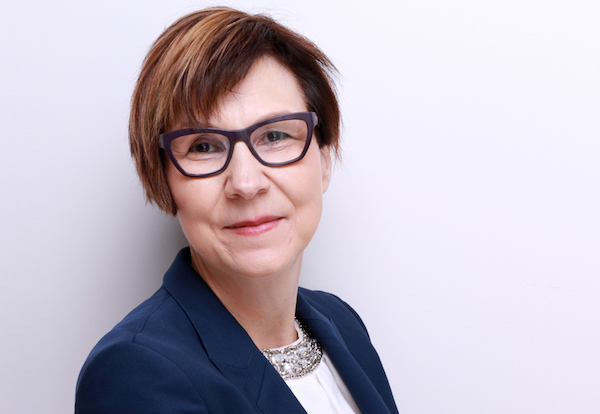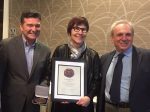Bernard Richard, left, Cindy Blackstock and Jerry Nussbaum. (photo from Janusz Korczak Association of Canada)
As executive director of the First Nations Child and Family Caring Society of Canada, Dr. Cindy Blackstock initiated a human rights complaint against the Government of Canada, alleging that the country discriminates against First Nations by consistently underfunding child welfare services on reserves, a complaint her agency filed jointly with the Assembly of First Nations. After nine years of waiting for a decision, Blackstock, who is also a professor of social work at McGill University, was attending a graduation ceremony when she received an email with an attachment bearing the decision of the Canadian Human Rights Tribunal.
“I read the first words of the decision and it said, ‘This decision is about children,’ underlined. I knew it was a good decision,” Blackstock told an audience at a Richmond hotel April 12, where she was honoured with the Janusz Korczak Medal for Children’s Rights Advocacy.
She left the ceremony and went home to put on her gumboots and collect a teddy bear, named Spirit Bear, who she said had witnessed the nine-year process with her. Then she bought a bouquet of flowers and drove to Ottawa’s Beechwood Cemetery.
“I walked through the snow down a little valley to a modest tombstone with the name Peter Henderson Bryce on it,” she recalled. Bryce was a federal civil servant in the Indian Affairs Department at the turn of the last century who blew the whistle on Canada’s treatment of indigenous peoples, particularly alerting the government and the public to the mortality rate of 14% to 24% at residential schools and a 42% infant mortality rate on reserves. His report, The Story of a National Crime: Being a Record of the Health Conditions of the Indians of Canada from 1904 to 1921, was never made public by the government and Bryce was fired.
“He sacrificed his career and was retaliated [against] for it, but he would not be silent,” said Blackstock. “He kept talking even if nobody was listening because he knew that it was our job as adults to stand up for kids, to love children more than we fear for ourselves.”
At the cemetery, she read the tribunal decision, which determined that Ottawa discriminates against children on reserves by spending less on child welfare solely because of race and national or ethnic background. As a result, the decision stated, First Nations children suffer adverse impacts from funding service gaps, delays and denials.
After she read the ruling at the gravesite, she looked back up the hill from where she had just walked.
“And I saw the one set of footsteps in the snow and although those were made with me and my gumboots and the Spirit Bear, I knew that they also had the spirits of people like Dr. Korczak, of all the families who had stood up to protect their kids and hide them in the bush or prayed for them when they were in the schools, of the people, the non-aboriginal people like Dr. Bryce, who had been allies of justice for the children. So, I hugged his tombstone and I said, ‘Justice, Dr. Bryce, finally justice.’”
Blackstock, a member of the Gitxsan nation in northern British Columbia, said she was honoured to have her name mentioned in the same sentence as Korczak, who is viewed as the founder of children’s rights. Before she was presented with the medal by Jerry Nussbaum, president of the Janusz Korczak Association of Canada, Korczak was described by Lillian Boraks-Nemetz of the Korczak association as “a children’s advocate, their doctor, their friend and teacher.”
“He penned his own index of children’s rights, which is reflected in the United Nations Charter,” she said. “His Warsaw Ghetto diary and other writings inform us how he, through self-examination and experience, became a man with deep concern and compassion for a child’s welfare, a child’s healing not only of the body but also of the soul.”
Korczak ran his orphanage in Warsaw as a microcosmic laboratory, Boraks-Nemetz said, “where he practised and researched his philosophy on how to love a child and on children’s rights. There, he conducted a child’s court, where children expressed their grievances in front of the judges and jury made up of children.”
She spoke of her own experience implementing Korczak’s theories.
“When my children were small, my own children, I adopted this method partially and invited my own children to the family room once a week where they would express their grievances to us, their parents,” she said to laughter from the audience. “We would hear them out and discuss solutions to all sorts of problems and this worked very well, as our children needed to gain confidence in themselves and to express their feelings and thoughts, to be treated fairly with an acknowledgement of their rights to justice.”
Korczak’s philosophy, she said, was that 100 children are 100 human beings – “not some day, not ‘not yet,’ not tomorrow. They are human beings now.”
She then told the story of Korczak’s ultimate heroism.
“He would not desert the 200 orphans he cared for in the Warsaw Ghetto during the Second World War,” she said. “This was at the time when the orphanage was marked for Nazi deportations of Jews.… Korczak was offered a reprieve from being deported, but he said, ‘My children need me’ and went with them to Treblinka death camp, where they all perished.”
Boraks-Nemetz quoted Irena Sendler, a Polish rescuer of ghetto children, who said, “When, on Aug. 6, 1942, I saw that tragic parade in the street, those innocent children walking obediently in the procession of death and listening to the doctor’s optimistic words, I do not know why, for me and for all the other eyewitnesses, our hearts did not break.”
Bernard Richard, British Columbia’s Representative for Children and Youth, said some might think it difficult to make comparisons between a Polish Jewish man who died in the Holocaust and an indigenous Canadian woman who is still living – “and kicking, some would say.”
“But Cindy Blackstock is being given the medal for children’s rights advocacy because her work – and her life – has embodied the spirit of the man for whom the medal is named,” Richard said. Throughout the nine-year process, he added, “She was tenacious, and persistent, determined, passionate and committed, all characteristics shared with Janusz Korczak.”
Marvin Bernstein, UNICEF Canada’s chief policy advisor, said Canada has a longstanding pattern of underfunding child welfare services for First Nations children living on reserves, affecting 165,000 First Nations children and their families. The tribunal decision on Jan. 26, 2016, was a turning point for the country.
“It’s clear to UNICEF Canada that Cindy has been on the right side of history from the very beginning and has left an enduring legacy of advancing First Nations children’s rights.”


